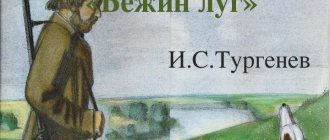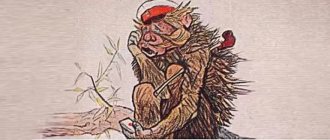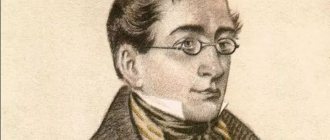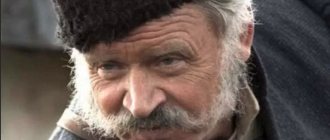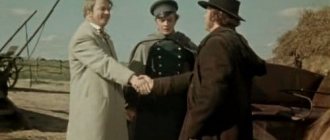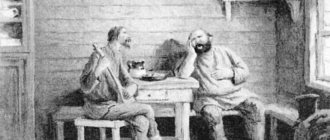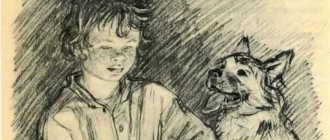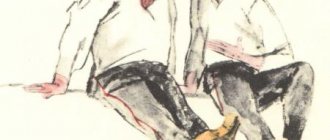History of creation
The story “The Wonderful Doctor” is based on a true story told by one of the heroes of the work to the author. Kuprin was in Kyiv in 1897, where he heard a touching story from a banker. In the same year, on December 25, a story was published in the Kyiv Slovo newspaper. The prototype of the wonderful doctor is the famous surgeon Nikolai Pirogov.
The banker himself became the hero of his own story. More than 30 years ago, he found himself below the poverty line: all the misfortunes befell his family at one moment, and they barely made ends meet. People had nothing to eat and a stove to light; they froze in a cold, windswept closet, and no longer hoped for anything, because all sources of help had already become scarce. The banker himself was then one of the children in this family and was very upset by the illness of his younger sister, who was doomed to die in such conditions. The father of the poor children was driven to extremes and wanted to take his own life, but at some point a benefactor, Doctor Pirogov, came to visit them. He became famous for helping everyone who asked for help. All the poor people knew and loved him. The doctor not only treated the girl for free, but also gave money to the desperate father of the family. The man was able to get back on his feet and provide for his family only thanks to a caring person. Therefore, we can say that the story of writing the story “The Wonderful Doctor” began in real life - when one person extended a helping hand to another without self-interest or calculation.
“The Wonderful Doctor”: key thoughts, images and characters of the story by A.I. Kuprina
Let's analyze the main thoughts of A.I. Kuprin's Christmas story, consider the main characters, their actions and life position. We will share methodological tips that will be useful for a literature teacher to complete a cycle of classes on a work.
Reproduction of Luke Fields's painting "The Doctor", 1891.
Meaning of the name
At the very beginning of the story, the author hastens to assure us that his story is completely true. The title of the story contains some idea of fiction - we are used to seeing everything wonderful, like miracles in general, in fairy tales. There is always a place for goodness, justice, and peace in them. In real life, these benefits have a hard time - they find themselves in a struggle with indifference, heartlessness, and evil. As many believe, among this struggle there is simply not enough room for something (or someone) wonderful. However, A.I. Kuprin makes us believe in our cohabitation with a miracle. It is not for nothing that he gives his story this title. The wonderful doctor - one of the main characters - looks like a wizard from a fairy tale. But the miraculousness of his words and deeds is not connected with magic. The reason is human sensitivity, kindness and the desire to help others. All this can create a real miracle. This means that every person can become a wonderful doctor - one who can heal another from the disease of despair.
Genre, direction
The work “The Wonderful Doctor” was created based on real events, and therefore belongs to the realistic direction. The author was also a representative of realism.
The genre is a story, but many specify that it relates to Christmas or Christmas. This genre involves a quick start with a certain problem and the same ending with the use of a miracle. The work has its own pure and bright ending: good defeats evil, and faith in a miracle is justified.
Meaning of the name
The author called his story “The Wonderful Doctor” for two reasons:
- All the action took place on Christmas Eve. You could say this is a heavenly miracle that descended on the family.
- The only person who immediately helped the stranger in his difficult situation was the doctor - a representative of the noblest art on earth. Without any moralizing or rude treatment, he extended a helping hand to those in need. This is the miracle that is so in harmony with the hero’s calling. But he healed not only diseases, but also the moral shortcomings of society, restoring people’s faith in goodness.
The gist: what is the story about?
The action takes place in the 60s of the 19th century in the city of Kyiv. The story begins with two boys staring at a display case with a pig. They cheerfully push each other, smile and laugh. But everything is not as happy as it turned out. The Mertsalov family lives off any pennies they find. The house is underground, there is no money, the head of the family was kicked out of work, a child died a year ago, and now her seven-year-old sister is still sick and needs money for treatment. There was no longer any hope left, the whole family was preparing for the worst outcome.
The father could not sit at home, since “sitting will not help anything” and went to beg. Thoughts about suicide begin to visit him more and more often and look less tragic and terrible. On the contrary, it is easier for him to die quickly than to look at his hungry and helpless family. But then Mertsalov saw a light that kept going out and coming back on. The man joyfully approaches his father and shares the news about the gifts. Mertsalov, unable to endure it any longer, began to scream furiously about his difficult life.
But fate turned its face to him and helped him meet the doctor. They immediately go back home. The doctor examines Mashutka and prescribes medicine, leaving the money for it next to the prescription note. In addition, he left several large bills. Without giving his name, the doctor hurried away. And only on the prescription itself it was written that this was the famous doctor - Pirogov.
The main characters and their characteristics
The main characters are the head of the Mertsalov family and Doctor Alexander Pirogov. The main characters of the story “The Wonderful Doctor,” according to the Many-Wise Litrekon, should take their place in the table.
| Pirogov | famous doctor of surgery. He knows how to communicate with people, what to tell them. His gaze and soft intonation in his voice immediately evoke trust. People believe him and approve of him. He didn’t think twice about whether he should help or not. He immediately went to the Mertsalovs’ house to do everything possible and save his daughter. The hero who told this story to the author calls the doctor a saint. He really was and will be like that. |
| Mertsalov | a broken man who once had everything: a job, money, a healthy family. Now he has lost it. But he was tired of fighting the cynicism and meanness of people. His family is one against everyone, no one wants to help them. The only way out for the head of the family is to commit suicide. Mertsalov is ashamed and offended that he cannot help his children and wife. The doctor saved him from a terrible mistake that would have led his entire family to death. |
Themes
In his story “The Wonderful Doctor,” the author raises important themes: mercy, humanity and kindness. This is the theme of the work:
- Responsiveness
. They are the ones who help make the world a better place. When Mertsalov loses all his vitality and falls into despair, then a wonderful doctor appears. With his indifference, he shows compassion for a stranger and helps him. - Kindness
. The doctor is equipped with an incredibly kind and sincere soul. He did not leave Mertsalov when he began to scream hopelessly. On the contrary, he began to listen to him carefully and did everything possible to make his daughter get better. Thanks to such people, the world becomes a kinder place. Pirogov took part with an open heart and saved Mashutka. Even thirty years later, Grisha remembered and acted on his commandments - to help those in need. - Family
. In difficult times, each of us must think not only about ourselves, but also about our family. Mertsalov almost destroyed them all by showing selfishness and weakness. But it was these people who became his support and motivation to overcome himself. In the future, he became successful again and regained his former wealth - he did all this for the sake of his loved ones. - Love
. This feeling is usually perceived as a romantic attraction between lovers, but it can also be felt towards people in general. Pirogov was able to fall in love with humanity and personally help many of its representatives.
Minor characters
An important role is played in Kuprin’s story “The Wonderful Doctor” by the main characters, along with whom minor characters appear, without whom this story would not have such a happy ending. It's worth getting to know them better:
The secondary and main characters of the work have a complex biography. Ordinary people, who find themselves in despair due to circumstances, are grasping at every last straw. The author decided to call his characters that for a reason.
When reading a story, an atypical picture is drawn in your head. It is contrasting, because from poor people the characters turn into a family living in prosperity. The magical transformation became possible thanks to the appearance of a kind, compassionate person in their lives. He did everything possible to make the light of the family flicker again in the firmament of life.
Source
Problems
The author reveals several problems in the short story “The Wonderful Doctor”, which are currently present in the life of every person.
- Despair
. A problem that is familiar to anyone who has ever faced a difficult situation. The solution does not come, and one gives up. Mertsalov comes to the point of ending this harsh life, forgetting about his family. Despair is synonymous with selfishness. He couldn’t cope with the problem, he was ashamed in front of his children and wife. The solution is to die. Not only he, but subsequently the whole family would have died from hunger. The reckless act might have happened if not for a miracle. - Social injustice
. The problem is touched upon in just a couple of moments, but already from them it becomes clear how tough people are. The boys are thrown out by the doorman, even though they have done nothing wrong. It was only because of their equal clothes, dirty faces, and poverty that they were driven away like stray dogs. Mertsalov was kicked out of work when he was sick with typhus. And when he recovered, someone else took his place. Injustice finds its place at every step. Mertsalov is no exception. The main thing is not to lose heart and fight for equal rights. - Humanity
. Mertsalov asks for alms every day and receives moral teachings and reproaches addressed to him: “We need to work, not beg.” Nobody cares about other people's problems. Nobody knows what the hero’s situation was; everyone saw his tattered coat. No one cares about social inequality until the person himself finds himself in such conditions. People have lost their humanity in pursuit of material wealth.
Minor characters
Master's doorman
He drives away and calls the children names, slapping Volodka so that they do not bother the master over trifles. Doesn't accept letters from his mother. A heartless, callous person.
Man in a raccoon coat
When Mertsalov asks for help, he replies that he needs to go to work.
The main characters of “The Wonderful Doctor” are ordinary people who, due to circumstances, find themselves in a desperate situation. The names of the characters play the role of characteristics in the work. The description of the everyday life of the Mertsalov family at the beginning and end of the story are sharply contrasting, which creates the effect of a magical transformation. The materials of the article may be useful for compiling a reader's diary or writing creative works based on Kuprin's work.
Source
main idea
The main idea of the story “The Wonderful Doctor” lies in one phrase uttered by the doctor: “Never lose heart.” There is always a way out of the situation, no matter what it is. Giving up, falling into despondency and despair is the last thing. You need to fight for life, and not reach for a rope with soap.
We must hope for a miracle that will definitely happen. And such a miracle can be performed by any person who does not stand aside. Kindness will save everyone and help not to carry out reckless actions. You should always be honest, sincere and kind towards others.
The author says that in our time such people have become negligibly few. Every mercy is perceived as a miracle, but this should not happen. This is the meaning of the story “The Wonderful Doctor”.
Characteristics of Elizaveta Ivanovna
Elizaveta Ivanovna Mertsalova is Emelyan’s wife. She has two children from her current marriage. The first-born is a 10-year-old boy Volodya. The second child is Grisha. The youngest daughter is a sick girl Masha. Unlike her husband, the woman does not despair and tries to find a way out of the situation:
She is forced to do this, because she has three children on her fragile shoulders. The woman cannot watch her daughter gradually die. Elizabeth can only cry. Gather all your will into a fist, while losing the last drops of hope.
What does it teach?
The work “The Wonderful Doctor” teaches that each of us should not remain indifferent to people. Passing by the homeless, the poor, the old, the sick, we do not notice that they need help. People forget about compassion and mercy. Everyone can find themselves in a similar situation as Mertsalov. It is important not to pass by and support in any situation. If not with money, then at least with words. Such an action can change a person's irreparable decision.
Helping one person will not radically change the whole world, but at least it will direct one life in the right direction. Kuprin makes the reader think about this. This is the moral of the story “The Wonderful Doctor.”
Artistic Features
A. Kuprin resorts to a stylistic device as an antithesis. At the beginning, he describes a colorful Christmas street, which is decorated with a huge Christmas tree. A sharp change in the episode, and the author is already talking about the creepy basement in which the heroes live. Details immerse the reader even more in this world: walls crying from dampness, the smell of poverty, the cry of a child, a summer coat in winter, and so on.
And also the use of epithets that reveal and describe the picture of that day: “a dilapidated house”, “a dirty wide bed”, “a stuffy, dank room”, “Red strong apples”, “Tangerines, tenderly golden”, “a thick layer of pink lard”.
LiveInternetLiveInternet
Kuprin A.I.
WONDERFUL DOCTOR
The following story is not the fruit of idle fiction. Everything I described actually happened in Kyiv about thirty years ago and is still sacred, down to the smallest detail, preserved in the traditions of the family in question. For my part, I only changed the names of some of the characters in this touching story and gave the oral story a written form. - Grisha, oh Grisha! Look, the little pig... He's laughing... Yes. And in his mouth!.. Look, look... there is grass in his mouth, by God, grass!.. What a thing! And two boys, standing in front of a huge solid glass window of a grocery store, began to laugh uncontrollably, pushing each other in the side with their elbows, but involuntarily dancing from the cruel cold. They had been standing for more than five minutes in front of this magnificent exhibition, which excited their minds and stomachs in equal measure. Here, illuminated by the bright light of hanging lamps, towered whole mountains of red, strong apples and oranges; there were regular pyramids of tangerines, delicately gilded through the tissue paper enveloping them; stretched out on the dishes, with ugly gaping mouths and bulging eyes, huge smoked and pickled fish; below, surrounded by garlands of sausages, juicy cut hams with a thick layer of pinkish lard flaunted... Countless jars and boxes with salted, boiled and smoked snacks completed this spectacular picture, looking at which both boys for a moment forgot about the twelve-degree frost and about the important assignment assigned their mother, an assignment that ended so unexpectedly and so pitifully.
The eldest boy was the first to tear himself away from contemplating the enchanting spectacle. He tugged at his brother’s sleeve and said sternly: “Well, Volodya, let’s go, let’s go... There’s nothing here...” At the same time suppressing a heavy sigh (the eldest of them was only ten years old, and besides, both of them had eaten nothing since the morning except empty cabbage soup) and Having cast one last lovingly greedy glance at the gastronomic exhibition, the boys hastily ran down the street. Sometimes, through the foggy windows of some house, they saw a Christmas tree, which from a distance seemed like a huge cluster of bright, shining spots, sometimes they even heard the sounds of a cheerful polka... But they courageously drove away the tempting thought: to stop for a few seconds and press their eyes to the glass.
As the boys walked, the streets became less crowded and darker. Beautiful shops, shining Christmas trees, trotters racing under their blue and red nets, the squealing of runners, the festive excitement of the crowd, the cheerful hum of shouts and conversations, the laughing faces of elegant ladies flushed with frost - everything was left behind. There were vacant lots, crooked, narrow alleys, gloomy, unlit slopes...
Finally they reached a rickety, dilapidated house that stood alone; its bottom - the basement itself - was stone, and the top was wooden. Having walked around the cramped, icy and dirty courtyard, which served as a natural cesspool for all residents, they went downstairs to the basement, walked in the darkness along a common corridor, groped for their door and opened it. The Mertsalovs had been living in this dungeon for more than a year. Both boys had long since gotten used to these smoky walls, crying from the dampness, and to the wet scraps drying on a rope stretched across the room, and to this terrible smell of kerosene fumes, children's dirty linen and rats - the real smell of poverty.
But today, after everything they saw on the street, after this festive rejoicing that they felt everywhere, their little children’s hearts sank with acute, unchildish suffering. In the corner, on a dirty wide bed, lay a girl of about seven years old; her face was burning, her breathing was short and labored, her wide, shining eyes looked intently and aimlessly. Next to the bed, in a cradle suspended from the ceiling, a baby was screaming, wincing, straining and choking. A tall, thin woman, with a gaunt, tired face, as if blackened by grief, was kneeling next to the sick girl, straightening her pillow and at the same time not forgetting to push the rocking cradle with her elbow. When the boys entered and white clouds of frosty air quickly rushed into the basement behind them, the woman turned her worried face back. - Well? What? - she asked abruptly and impatiently. The boys were silent. Only Grisha noisily wiped his nose with the sleeve of his coat, made from an old cotton robe. - Did you take the letter?.. Grisha, I’m asking you, did you give the letter? “I gave it away,” Grisha answered in a voice hoarse from the frost. - So what? What did you say to him? - Yes, everything is as you taught. Here, I say, is a letter from Mertsalov, from your former manager. And he scolded us: “Get out of here, he says... You bastards...” - Who is this? Who was talking to you?.. Speak clearly, Grisha! - The doorman was talking... Who else? I tell him: “Uncle, take the letter, pass it on, and I’ll wait for the answer here downstairs.” And he says: “Well, he says, keep your pocket... The master also has time to read your letters...” - Well, what about you? “I told him everything, as you taught me: “There’s nothing to eat... Mashutka is sick... She’s dying...” I said: “As soon as dad finds a place, he’ll thank you, Savely Petrovich, by God, he’ll thank you.” Well, at this time the bell will ring as soon as it rings, and he tells us: “Get the hell out of here quickly! So that your spirit is not here!..” And he even hit Volodka on the back of the head. “And he hit me on the back of the head,” said Volodya, who was following his brother’s story with attention, and scratched the back of his head. The older boy suddenly began to anxiously rummage through the deep pockets of his robe. Finally pulling out the crumpled envelope from there, he put it on the table and said: “Here it is, the letter…” The mother didn’t ask any more questions. For a long time in the stuffy, dank room, only the frantic cry of the baby and Mashutka’s short, rapid breathing, more like continuous monotonous moans, could be heard. Suddenly the mother said, turning back: “There is borscht there, left over from dinner... Maybe we should eat?” Only cold, there’s nothing to warm it up... At that time, someone’s hesitant steps and the rustling of a hand searching for the door in the darkness were heard in the corridor. The mother and both boys - all three even turning pale from intense anticipation - turned in this direction. Mertsalov entered. He was wearing a summer coat, a summer felt hat and no galoshes. His hands were swollen and blue from the frost, his eyes were sunken, his cheeks were stuck around his gums, like a dead man’s. He didn’t say a single word to his wife, she didn’t ask him a single question. They understood each other by the despair they read in each other's eyes. In this terrible, fateful year, misfortune after misfortune persistently and mercilessly rained down on Mertsalov and his family. First, he himself fell ill with typhoid fever, and all their meager savings were spent on his treatment. Then, when he recovered, he learned that his place, the modest place of managing a house for twenty-five rubles a month, was already taken by someone else... A desperate, convulsive pursuit began for odd jobs, for correspondence, for an insignificant place, pledge and re-pledge of things, sale all kinds of household rags. And then the children started getting sick. Three months ago one girl died, now another lies in the heat and unconscious. Elizaveta Ivanovna had to simultaneously care for a sick girl, breastfeed a little one and go almost to the other end of the city to the house where she washed clothes every day. All day today I was busy trying to squeeze out from somewhere at least a few kopecks for Mashutka’s medicine through superhuman efforts. For this purpose, Mertsalov ran around almost half the city, begging and humiliating himself everywhere; Elizaveta Ivanovna went to see her mistress, the children were sent with a letter to the master whose house Mertsalov used to manage... But everyone made excuses either with holiday worries or lack of money... Others, like, for example, the doorman of the former patron, simply drove the petitioners off the porch . For ten minutes no one could utter a word. Suddenly Mertsalov quickly rose from the chest on which he had been sitting until now, and with a decisive movement pulled his tattered hat deeper onto his forehead. - Where are you going? - Elizaveta Ivanovna asked anxiously. Mertsalov, who had already grabbed the door handle, turned around. “Anyway, sitting won’t help anything,” he answered hoarsely. “I’ll go again... At least I’ll try to beg.”
Going out into the street, he walked forward aimlessly. He didn't look for anything, didn't hope for anything. He had long ago experienced that burning time of poverty when you dream of finding a wallet with money on the street or suddenly receiving an inheritance from an unknown second cousin. Now he was overcome by an uncontrollable desire to run anywhere, to run without looking back, so as not to see the silent despair of a hungry family. Beg for alms? He has already tried this remedy twice today. But the first time, some gentleman in a raccoon coat read him an instruction that he should work and not beg, and the second time, they promised to send him to the police. Unnoticed by himself, Mertsalov found himself in the center of the city, near the fence of a dense public garden. Since he had to walk uphill all the time, he became out of breath and felt tired. Mechanically he turned through the gate and, passing a long alley of linden trees covered with snow, sat down on a low garden bench.
It was quiet and solemn here. The trees, wrapped in their white robes, slumbered in motionless majesty. Sometimes a piece of snow fell from the top branch, and you could hear it rustling, falling and clinging to other branches. The deep silence and great calm that guarded the garden suddenly awakened in Mertsalov’s tormented soul an unbearable thirst for the same calm, the same silence. “I wish I could lie down and go to sleep,” he thought, “and forget about my wife, about the hungry children, about the sick Mashutka.” Putting his hand under his vest, Mertsalov felt for a rather thick rope that served as his belt. The thought of suicide became quite clear in his head. But he was not horrified by this thought, did not shudder for a moment before the darkness of the unknown. “Rather than dying slowly, isn’t it better to take a shorter path?” He was about to get up to fulfill his terrible intention, but at that time, at the end of the alley, the creaking of steps was heard, clearly heard in the frosty air. Mertsalov turned in this direction with anger. Someone was walking along the alley. At first, the light of a cigar that flared up and then went out was visible. Then Mertsalov little by little could see an old man of short stature, wearing a warm hat, a fur coat and high galoshes. Having reached the bench, the stranger suddenly turned sharply in the direction of Mertsalov and, lightly touching his hat, asked: “Will you allow me to sit here?” Mertsalov deliberately turned sharply away from the stranger and moved to the edge of the bench. Five minutes passed in mutual silence, during which the stranger smoked a cigar and (Mertsalov felt it) looked sideways at his neighbor.
“What a nice night,” the stranger suddenly spoke. “It’s frosty... quiet.” What a delight - Russian winter! His voice was soft, gentle, senile. Mertsalov was silent, without turning around. “But I bought gifts for the children of my acquaintances,” continued the stranger (he had several packages in his hands). “But on the way I couldn’t resist, I made a circle to go through the garden: it’s very nice here.” Mertsalov was generally a meek and shy person, but at the last words of the stranger he was suddenly overcome by a surge of desperate anger. He turned with a sharp movement towards the old man and shouted, absurdly waving his arms and gasping for breath: - Gifts! ... Gifts!.. And the wife’s milk disappeared, and the infant did not eat all day... Gifts!.. Mertsalov expected that after these chaotic, embittered screams the old man would get up and leave, but he was mistaken. The old man brought his smart, serious face with gray sideburns closer to him and said in a friendly but serious tone: “Wait... don’t worry!” Tell me everything in order and as briefly as possible. Maybe together we can come up with something for you. There was something so calm and trust-inspiring in the stranger’s extraordinary face that Mertsalov immediately, without the slightest concealment, but terribly worried and in a hurry, conveyed his story. He spoke about his illness, about the loss of his place, about the death of his child, about all his misfortunes, right up to the present day.
The stranger listened without interrupting him with a word, and only looked more and more inquisitively into his eyes, as if wanting to penetrate into the very depths of this painful, indignant soul. Suddenly, with a quick, completely youthful movement, he jumped up from his seat and grabbed Mertsalov by the hand. Mertsalov involuntarily also stood up. - Let's go! - said the stranger, dragging Mertsalov by the hand. - Let's go quickly!.. You are lucky that you met the doctor. Of course, I can’t vouch for anything, but... let’s go! Ten minutes later Mertsalov and the doctor were already entering the basement. Elizaveta Ivanovna lay on the bed next to her sick daughter, burying her face in dirty, oily pillows. The boys were slurping borscht, sitting in the same places. Frightened by the long absence of their father and the immobility of their mother, they cried, smearing tears over their faces with dirty fists and pouring them abundantly into the smoky cast iron.
Entering the room, the doctor took off his coat and, remaining in an old-fashioned, rather shabby frock coat, approached Elizaveta Ivanovna. She didn't even raise her head when he approached. “Well, that’s enough, that’s enough, my dear,” said the doctor, affectionately stroking the woman on the back. “Get up!” Show me your patient.
And just like recently in the garden, something affectionate and convincing sounding in his voice forced Elizaveta Ivanovna to instantly get out of bed and unquestioningly do everything the doctor said. Two minutes later, Grishka was already heating the stove with firewood, for which the wonderful doctor had sent to the neighbors, Volodya was inflating the samovar with all his might, Elizaveta Ivanovna was wrapping Mashutka in a warming compress... A little later Mertsalov also appeared. With three rubles received from the doctor, during this time he managed to buy tea, sugar, rolls and get hot food at the nearest tavern. The doctor was sitting at the table and writing something on a piece of paper that he had torn out of his notebook. Having finished this lesson and having drawn some kind of hook below instead of a signature, he stood up, covered what he had written with a tea saucer and said: “With this piece of paper you will go to the pharmacy... give me a teaspoon in two hours.” This will cause the baby to cough up... Continue the warming compress... Besides, even if your daughter feels better, in any case, invite Doctor Afrosimov tomorrow. He is an efficient doctor and a good person. I'll warn him right now. Then farewell, gentlemen! May God grant that the coming year treats you a little more leniently than this one, and most importantly, never lose heart. Having shaken the hands of Mertsalov and Elizaveta Ivanovna, who was still reeling from amazement, and casually patting Volodya, who was open-mouthed, on the cheek, the doctor quickly put his feet into deep galoshes and put on his coat. Mertsalov came to his senses only when the doctor was already in the corridor, and rushed after him. Since it was impossible to make out anything in the darkness, Mertsalov shouted at random: “Doctor!” Doctor, wait!.. Tell me your name, doctor! Let at least my children pray for you! And he moved his hands in the air to catch the invisible doctor. But at this time, at the other end of the corridor, a calm, senile voice said: “Eh!” Here are some more nonsense!.. Come home quickly! When he returned, a surprise awaited him: under the tea saucer, along with the wonderful doctor’s prescription, lay several large banknotes... That same evening, Mertsalov learned the name of his unexpected benefactor. On the pharmacy label attached to the bottle of medicine, in the clear hand of the pharmacist it was written: “According to the prescription of Professor Pirogov .” I heard this story, more than once, from the lips of Grigory Emelyanovich Mertsalov himself - the same Grishka who, on the Christmas Eve I described, shed tears into a smoky cast iron pot with empty borscht. Now he occupies a fairly large, responsible position in one of the banks, reputed to be a model of honesty and responsiveness to the needs of poverty. And each time, finishing his story about the wonderful doctor, he adds in a voice trembling with hidden tears: “From now on, it’s like a beneficent angel descended into our family.” Everything has changed. At the beginning of January, my father found a place, Mashutka got back on her feet, and my brother and I managed to get a place in the gymnasium at public expense. This holy man performed a miracle. And we have only seen our wonderful doctor once since then - this was when he was transported dead to his own estate Vishnya. And even then they didn’t see him, because that great, powerful and sacred thing that lived and burned in the wonderful doctor during his lifetime died out irrevocably.
https://www.prosv.ru/ebooks/lib/51_Kuprin_Rasskazi/1.html#a1
https://www.labirint.ru/screenshot/goods/201359/1/
